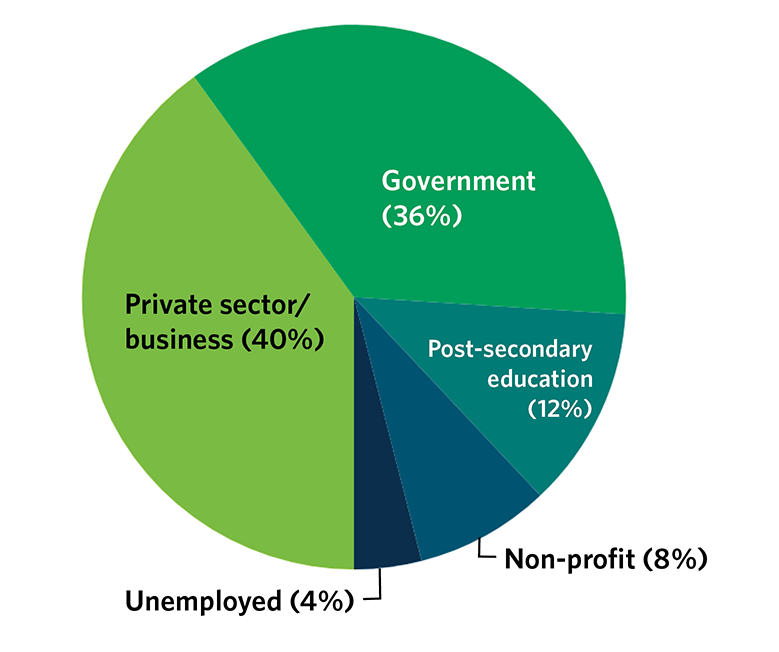
Canada is not on track to meet its 2030 target of reducing GHG emissions by 40 percent below 2005 levels, despite implementing several climate policies and initiatives.[1] Dramatic changes to how the private and public sectors operate are still required in order to meet this challenge.
Policymakers and climate action planners in local and regional government, and consultants in the private sector are at the forefront of efforts to make progress towards this target, but need the right tools and evidence to support their work.
To support progress in this vital area, UBC faculty and staff climate collaborated to create a brand-new Climate Action Planning Micro-certificate — helping businesses and government learn about policy and planning approaches that can lead to the rapid emissions reductions required.

“Effective climate action plans need the involvement of three types of expertise that are in constant conversation with each other — scientific and technical, operational, and institutional expertise. The units involved in the delivery of this program bring together these critical elements.” —Dr. Milind Kandlikar, UBC IRES
According to Dr. Milind Kandlikar, Professor (and past Director) at the Institute for Resources, Environment and Sustainability, “effective climate action plans need the involvement of three types of expertise that are in constant conversation with each other — scientific and technical expertise that helps articulate key problems and suggest solutions; operational expertise that can customize and implement solutions; and institutional expertise that provides the contextual knowledge critical for these solutions to be successful.”
“The three units involved in the delivery of this program,” adds Kandlikar, “the Institute for Resources, Environment and Sustainability (IRES), UBC's Campus and Community Planning, and the Sustainability Hub bring together these three critical elements. IRES is an interdisciplinary academic powerhouse at UBC on the climate energy transition, Campus + Community planning provides the operational knowledge about how energy transitions can be planned and executed, and the Sustainability Hub has over a decade of experience bringing academic communities together with those involved in 'on the ground action'.”
First cohort of 28 learn how to source climate data, and about the essential building blocks of a climate action plan
The UBC Micro-certificate in Climate Action Planning: Foundations, Finance and Implementation is a part-time online program that helps policy makers, planners and industry players gain the knowledge, skills and tools to put climate action planning into practice within organizations and communities.
In its first year, 28 business and government professionals took part in the new Micro-certificate program. This directly supports climate actions efforts in the province, and expands the reach and influence of UBC’s climate expertise across BC.

Micro-certificate Quick Facts
- 100% online micro-certificate
- 50 hours in total (over 10 weeks)
- 10 live online classes
- 5 hours of learning per week:
- Live session (1.5 hours)
- Assignments, readings and videos (3.5 hours)
"We learned about climate change and how it impacts communities, [...] where to find data and information about climate change in Canada and how to interpret this information in the context of a region or an organization, [...] and how to build a climate action plan for an organization." —Micro-certificate participant
The micro-certificate program starts with grounding participants in the basic science of climate change: its causes and consequences, and the case for climate action; as well as familiarity with climate risk impacts and their associated data sources, and the ability to describe the disproportionate impacts of climate change on marginalized communities and the need for climate justice and indigenous involvement.

89% of respondents were satisfied with the program
Sectors represented by students in the UBC Climate Action Planning Micro-certificate

According to Oliver Lane, Manager, Teaching and Learning, UBC Sustainability Hub, demand for the Micro-certificate and the variety of participants in just its first year was very encouraging.
“Participants came from a range of organizations and work backgrounds, each with varying levels of knowledge about climate change.” —Oliver Lane, UBC Sustainability Hub
As the chart on the left illustrates, roughly a third of learners worked in government, a third in the private sector, and the other third included post-secondary education institutions, the non-profit sector and those looking for new employment in the climate space.
“We knew there was demand for this kind of training in most sectors of the economy,” notes Lane. “But given it was our first offering of the program, we didn’t know who would sign up and what the mix would look like exactly. It was great to see the diversity of backgrounds and experiences coming together in this learning space”.
Understanding the physical, social, and financial aspects of a climate action plan
Based on the experience of UBC expert staff, the Micro-certificate covers not only knowledge of the key components of a climate action plan, but also an understanding of the role of stakeholder and community engagement as a key pillar in effective implementation strategies.
In addition, an introductory understanding of GHG inventories and their utility is paired with an awareness of the financial aspects of climate action planning, including mitigation opportunities and costing methods, how to navigate financial constraints and integrate resiliency considerations with mitigation and net-zero goals. Plus valuable lessons and experiences from putting a climate action plan into practice for a selected community or organization.

78% of participants found the content applicable to their career or personal goals and increased their knowledge and skills in the subject matter

"[...] this course has assisted in developing a broader understanding of the targets we strive to meet in my organization, I [now] have more of an opinion, and credibility when it comes to producing, tracking, and presenting to these targets." —Micro-certificate participant
“This course provides learners with practical methods and approaches to addressing climate action using real case studies and precedents that can be tailored to large and small organizations." —John Madden, UBC Campus and Community Planning

Updates for year two: further focus on taking action
As they look ahead to year two, the collaborative team of faculty and staff experts recognize the need to adjust content and approaches based on the changing context in Canada, plus the demand for particular topics and content from participants.
“We learned there is an appetite for practical training in climate action planning and have adapted the content to be even more centred on taking action,” reports Sara Elder, PhD, Senior Policy Advisor, and an Adjunct Professor at the Institute for Resources, Environment and Sustainability.
“[the Micro-certificate]… is designed to provide essential knowledge, but also familiarity with tools and processes for participants to initiate climate action planning in their organizations and communities.”
Learn more about this program
For more information, please visit the UBC Climate Action Planning Micro-certificate section of UBC Extended Learning’s website.